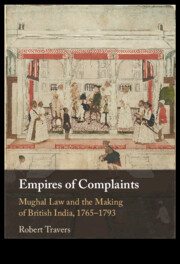Book contents
- Empires of Complaints
- Empires of Complaints
- Copyright page
- Dedication
- Contents
- Figures and Map
- Acknowledgements
- Note on Transliteration and Names
- Abbreviations
- Maps
- Introduction
- 1 Petitioning, Taxation, and Law in Eighteenth-Century Bengal
- 2 Recasting Mughal Law
- 3 Zamindari Succession Disputes and Persianate Hindu Law
- 4 ‘At the Durbar’ in Calcutta
- 5 A Jagirdar’s Lament
- 6 Conclusion
- Select Bibliography
- Index
4 - ‘At the Durbar’ in Calcutta
Banians, Revenue Farming, and the Politics of Landed Debt
Published online by Cambridge University Press: 08 September 2022
- Empires of Complaints
- Empires of Complaints
- Copyright page
- Dedication
- Contents
- Figures and Map
- Acknowledgements
- Note on Transliteration and Names
- Abbreviations
- Maps
- Introduction
- 1 Petitioning, Taxation, and Law in Eighteenth-Century Bengal
- 2 Recasting Mughal Law
- 3 Zamindari Succession Disputes and Persianate Hindu Law
- 4 ‘At the Durbar’ in Calcutta
- 5 A Jagirdar’s Lament
- 6 Conclusion
- Select Bibliography
- Index
Summary
In early colonial Bengal, pervasive disputes between urban creditors and tax-paying landlords (zamindars) shaped the East India Company's emergent system of civil justice. Mediating conflicts between creditors and landed debtors was already an important aspect of rulership under the nawabs of Bengal. The Company’s efforts at fiscal centralization, raising tax demands on landholders, and auctioning off ‘revenue farms’ – rights to collect local revenues in return for payments agreed in advance – to wealthy merchants (banians), further intensified conflicts in the countryside. By exploring the controversial efforts of banians to accumulate land rights, and by tracing the Company's hesitant efforts to adjudicate disputes over land and credit, this chapter further reveals how the Company's strategies of legal and fiscal centralization depended on the adaptation and reworking late Mughal, Persianate practices of claimsmaking and dispute resolution. It shows how the Company's efforts to consolidate zamindari rights as a saleable, mortgageable form of taxable private property were being worked out as much in judicial inquiries and decrees as in central legislation.
Keywords
- Type
- Chapter
- Information
- Empires of ComplaintsMughal Law and the Making of British India, 1765–1793, pp. 163 - 204Publisher: Cambridge University PressPrint publication year: 2022



